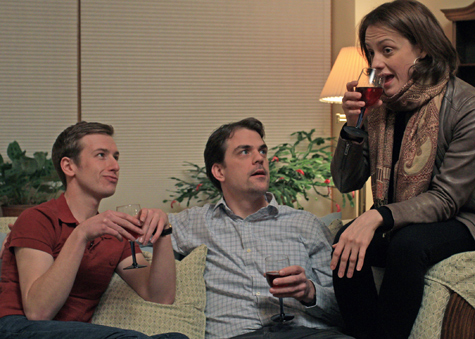
MORE THAN JUST THE TWO OF THEM Outside characters complicate Next Fall. |
There's only one major problem in the love between Adam (Rob Cameron), a sarcastic would-be teacher working in retail, and Luke (Joe Bearor), an aspiring young actor. It's not that Luke is a good decade Adam's junior (that's actually pretty hot) or that Adam is a raging hypochondriac. The problem, in Geoffrey Nauffts's comedic drama Next Fall, directed by Brian P. Allen at the Good Theater, is that Luke considers their love a sin.
Don't get Luke wrong. "That was some amazing sinning we just did," he grins to casually atheistic Adam on a morning soon after they've met downtown in New York City. But it's no joke: Luke is an unwaveringly devout Christian, one who accepts the traditional dictum against his own sexuality. As he and Adam deepen their commitment over five years, Luke's faith creates ever more disharmony between them — Adam is hurt by Luke's prayers after sex; Luke by Adam's refusal to be saved. But what really blows the conflict open is a terrible car accident that lands Luke comatose and brain-damaged in the hospital. Next Fall jumps us back and forth between scenes before the accident, chronicling the men's relationship, and after, when Luke's parents, friends, and lover wait, commune, and sometimes do philosophical battle in a hospital waiting room.
Luke and Adam's timeline stretches across the stage visually in soft taupe tones: An apartment, a waiting room, and a church pew. On the apartment end, we encounter the couple and their self-described "fag hag" friend Holly (Abigail Killeen), who owns a tchotchke shop; the waiting room brings Holly and Adam together with Luke's divorced Southern parents Arlene (Moira Driscoll), who is kind, frank, and funny but has been an addict; and brash man's man Butch (Tony Reilly), whose name sort of says it all. Together, whether recalling Luke's starring turn in Our Town or smoldering over evolution, they create a richly textured gestalt of the complicated love that the unconscious man has inspired.
In Bearor's hands, that man is sweetly, mischievously, at times angelically endearing, and brings a beautiful and witty warmth to his and Adam's rapport — the two of them wrestling/cuddling on the couch is a delight of affection. But Bearor is also adept at turning on Luke's earnest, immovable surety about his faith, which so confounds and infuriates his lover, and making that belief seem less a contradiction than a complexity in character. As his older, wryer, less graceful partner, Cameron is both funny and affecting as he shows the wariness and the deep desire for intimacy with which Adam is slowly drawn out and into love.
Adam is of a different cohort than Luke in both age and faith, and Cameron's irreverent rapport with Killeen's vibrant, bantering Holly poses a revealing contrast to his romantic relationship. Further contrasts come in the terse, mysterious, Bible-carrying character of Brandon (Matt Delamater, evocative in a difficult, elusive role), who turns up at the hospital, and who has had an undisclosed species of relationship with Luke. And as Luke's parents, Driscoll and Reilly do beautiful and moving work balancing what they do and do not understand about their son, positioning their own beliefs and grief against those of Luke's friends; they make poignant characters out of often comic, easily caricatured types.